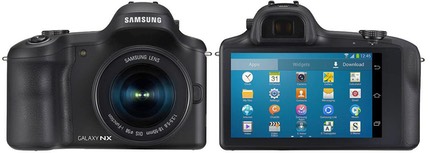Ah, wrong solutions to problems. How much do we enjoy those?
Samsung today officially announced the Galaxy NX camera. Basically take the Samsung NX 20, strip off all the buttons and controls, slap a big Galaxy phone on the back where the LCD was, and you've got a 20mp mirrorless camera that talks Android.

Some of you are probably expecting me to endorse that—I've long been known for asking for a communicating, programmable, modular camera, after all, and the Galaxy NX is two of the three—but you'd be wrong. It's right there in the first sentence.
Look, we have a lot of problems in photography, but some of them have been solved before, some haven't. The thing programmability coupled with communication gives you is the ability to ease the downstream workflow after you take the shot. What it doesn't do in this instance is keep the already known photographic solutions related to image capture, where the photographer controls lots of variables simultaneously to capture a moment in time the way they want to. Heck, the camera has as many "releases" as it does buttons (shutter and video releases versus function and flash buttons).
I also don't get why we have an eye-level viewfinder (EVF) if most of the settings changes are going to be made tapping the huge LCD on the back. Why wouldn't the NX300 be a better choice for this "style" of camera?
Having used the compact-camera based Galaxy camera and the Android-based Nikon Coolpix, I have to scratch my head over what problem the designers are trying to solve. Oh, wait, I know! They're solving the "this way we don't have to rewrite an OS from scratch" problem. And the marketing problem: "Versatile and easy to use, the GALAXY NX combines cutting edge optical performance with connectivity capabilities and galaxy of application based on Android eco-system, all in one stylish package." Phew! Buzzwords meet adjectives meet user benefit ("stylish package"; oh, wait, "easy to use").
If it seems like I'm writing with a bit of disdain today, you're not imagining it. I had a conversation with one of the mucky-mucks at Samsung at Photokina about this Android fixation (now with Tizen tinge) and what they thought this would do for the photographer. Every time I pushed, the answers came back with things it would do for Samsung, or sometimes what it would do for the user who wants to attempt Instagram-like processing on a 4.8" screen running from small batteries (okay, the Samsung has a huge battery, 4360mAh, but I'll bet it won't seem huge in practice). Damn. There's that disdain again.
The thing is, Samsung makes some fine cameras. The NX300 is right up there in terms of image quality, usability, and other factors that you should be considering in a camera. But why is it that Samsung (and others) want us to duplicate functionality we already have in our phones, tablets, and computers? A camera, should you buy a camera these days, should function first and foremost as the best possible camera it can be and fit into the downstream workflow seamlessly, whether it be Android, iOS, WiFi to Mac/Windows, or something you kludged up in your science class and are hoping to get a Kickstarter project rolling on.
And wait, what's that, there's a 4G LTE and 3G HSPA network in the camera (no phone capability, though)? Really? Let's see, I need a data plan for my phone and my tablet, now I need a data plan for my camera? what's next? My watch, probably, though Google wants it to be my glasses. Duplicating functionality is not solving user problems, though it certainly must be making AT&T and Verizon and all the other telecoms around the world happy. [Disclosure: I own AT&T and Verizon stock in my 401K.]
The problem that needs to be solved is how do you retain photographer control during shooting while hooking seamlessly into a wireless digital workflow that flows through the cloud. The problem that doesn't need to be solved is how you take an Android phone and slap it into a large mirrorless body just so you have a big sensor and interchangeable lenses.
At my advancing age I know this to be true: if you work on the wrong problem, you almost always come up with the wrong answer.
